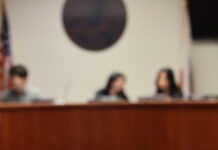 UCR’s Graduate School of Education (GSOE), in partnership with school districts across San Bernardino and Riverside Counties, are seeking to fill many teaching vacancies caused by the 2008 economic recession. In order to combat this shortage — especially in the science and special education fields — many school districts are offering new signing bonuses and expanding their outreach at job fairs at UCR.
UCR’s Graduate School of Education (GSOE), in partnership with school districts across San Bernardino and Riverside Counties, are seeking to fill many teaching vacancies caused by the 2008 economic recession. In order to combat this shortage — especially in the science and special education fields — many school districts are offering new signing bonuses and expanding their outreach at job fairs at UCR.
The Riverside and San Bernardino counties have shown a more than 70 percent drop in student enrollment for teaching programs. UCR hit a record low of student-teaching credential enrollment in 2013-2014 with only 69 students, increasing its enrollment to 140 for the 2015-2016 school year.
Maritza Rodriguez, the assistant dean for the GSOE and director of teacher education, explained, “There were fewer teachers going into teaching because there were not enough jobs … Now we’re facing a situation where we’re going to have more openings than we have teachers … Districts were laying off teachers that had been teaching for many years.”
With the passage of Proposition 30, which increased education spending in 2012, more schools had funding to hire more teachers, further increasing job openings. With these funds, school districts such as the Jurupa Unified School District have offered $2,500 signing bonuses to help recruit teachers.
To encourage undergraduates to pursue a career in education, the GSOE hosts information sessions and maintains close relationships with many of the academic advisers across campus. The school also works closely with the Riverside community through multiple partnerships with the Riverside County Office of Education and most local school districts such as Moreno Valley Unified School District, in addition to fundraising and outreach events.
Arlene Martinez, a UCR alumna and current GSOE teaching credential student, spoke on the issues she has faced while teaching special education.
”There’s only 4 of us in that (special education) specific field. This is a problem because there’s a shortage of special Education (sic) teachers,” Martinez elaborated through Facebook messenger, “Many current special Ed (sic) teachers are retiring. Many leave their positions for better opportunities after working 3 yrs. For some reason its (sic) much more difficult to retain teachers who have a moderate/severe class (low functioning students). Also there aren’t enough candidates going into the field. I know some districts had to move some of their Gen Ed teachers to fill in the empty Special Ed teaching positions.”
Martinez also spoke on what the GSOE has done to help improve this shortage in her cohort: “I’m currently taking this undergrad education course and they spoke about the shortage in Special Ed teachers (sic). This made many students reconsider their future goals. Hopefully next year the special Ed program gets more candidates because districts really need high quality teachers coming from accredited institutions.”
Alex Hill, another graduate student enrolled in the GSOE teaching program, also discussed how the school has handled this issue. “I’ve noticed a concerted effort to keep up with the new demand. I guess something I’d like to see our campus do to improve the shortage is just continue to grow the resources and facilities available to its students because now that there is increased demand, there is room to grow,” Hill explained.








